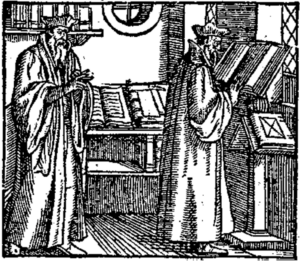"And this gives life to thee": Textual Reasons for Canonicity
17th International Connotations Symposium
July 30 - August 2, 2023
Kloster Schönenberg (Ellwangen, Germany)
Recent debates on canonicity have focused on how canons are a product of social and historical conditions as well as of reception. Texts become canonical when they are felt to embody the spirit of an age or to voice concerns considered universal at a particular moment. But what about the texts themselves? Can any text become canonical in any way? Or are there any specific textual reasons for such an elevated status? This latter question is what our symposium wishes to address.
Textual strategies of self-authorization may well be one of those reasons. When Shakespeare ends his Sonnet 18 on the notion of its ongoing life – “So long as eyes can see and men can breathe / So long lives this, and this gives life to thee” – he anticipates that neither his (ironically unnamed) addressee nor his own work will ever be forgotten. This is one example of how a speaker – and, by implication, an author – may promote the canonicity of a text.
A second group of reasons may have to do with the choice of subject matter. Do texts just recycle well-known material or are they innovative? Is there a balance to be struck between repetition and innovation as a textual recipe for canonization? Subject matter also comes in with the ways in which texts make offers to identify their relevance. This may have to do with the way in which a text combines the particular and the general.
Furthermore, textual reasons of canonicity may be sought in formal, rhetorical, and aesthetic features of a work. What is the energy of a story, play, or poem that “keeps children from play and old men from the chimney corner” (Sidney) and therefore makes it likely that it will be considered meaningful beyond its own time and place?
We invite contributions that address these and further dimensions and combine the detailed study of individual literary texts written in English with wider theoretical perspectives regarding the textual reasons of canonicity. They may include questions of methodology: how is it possible to arrive at such reasons by analyzing texts that have been assigned a canonical status? Do we need to compare texts, and/or does it make sense to work with larger corpora to come up with plausible results?
The book of abstracts is available for download here and the poster here.
Programme
Here you can also download the programme PDF here.
Sunday, July 30
Opening Dinner / Barbecue
Monday, July 31
08:30 Matthias Bauer & Angelika Zirker: Welcome and Opening Remarks
Chair: Angelika Zirker
08:45 Lena Linne: "Landmarks of the Oral Tradition: What the Reception of Homer's Epics Can Tell Us About Canonicity
09:45 Shelby Judge: "Multitextual Medea: Updating the Classical Canon"
10:45 Coffee Break
Chair: Capucine Blanc
11:15 Laurie Atkinson: "'Let clerkis ken the poetis different': Translating Canonicity in Gavin Douglas's Eneados (1513)"
12:15 Lunch Break
Chair: Lena Linne
13:30 Thomas Kullmann: "Anthologizing Shakespeare's Sonnets"
14:30 William Engel: "Literary Anthologies and Deliberating Canonicity"
15:30 Coffee Break
Chair: Laurie Atkinson
16:30 Rachel Stenner: "Is William Baldwin Canonical?: Anonymity, Distributed Authorship, and the Tudor Text"
17:30 Quingyu Wang: "Testing Canonicity with Historical Perspectives: A Comparative Study of Three 'King John' Plays in Sixteenth-Century England"
Tuesday, August 1
Chair: Julia Schatz
09:00 Jonathan Nauman: "From Rivers to Fountains: Henry Vaughan’s Secular and Sacred Inaugurations"
10:00 Lee Morrissey: "'Books are not absolutely dead things': Milton’s Creative Relationships with Readers"
11:00 Guided Tour of Kloster Schönenberg Church
12:30 Lunch Break
Chair: Sandra Wetzel
14:00 Nesrin Aydion Satar: "Consent of the Textual: Reasons for the Anti-Canonicity of Diaries"
15:00 David Fishelov: "And This Gives Life to Baby Shoes: Textual Reasons for the Canonicity of a Six-Word Story"
16:00 Coffee Break
Chair: Michael Reid
16:30 Neil Browne: "A Passage between Canonical and Experimental: The Example of Hart Crane’s The Bridge"
17:30 Judith Saunders: "Paradox as Closure: Canonicity in Lyric Poetry"
Wednesday, August 2
Chair: Matthias Bauer
08:30 Wolfgang Müller: "Conversations among Canonical Authors: The Role of Quotations and Allusions"
09:30 Beatrix Hesse: "Entering the Canon by Rewriting – Michael Cunningham’s The Hours"
10:30 Coffee Break
Chair: Burkhard Niederhoff
11:00 Francesca Pierini: "'Now Tell Me what else it Means': The Elaboration of the Canon in Contemporary Historical Fiction"
12:00 Angelika Zirker and Matthias Bauer: Summing Up
13:00 End of Conference
